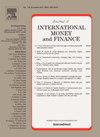具有行为预期的两国模型中的货币和财政政策
IF 2.8
2区 经济学
Q2 BUSINESS, FINANCE
引用次数: 0
摘要
我们检查了货币和财政政策(特别是其开放经济维度)是如何受到Gabaix(2020)精神下行为预期的影响的。我们首先表明,与标准理性预期假设相比,数据强烈支持这种设置。然后我们记录了一些新的发现。首先,当经济主体行为化时,货币政策的效力减弱,面临更高的牺牲比率。其次,泰勒原则受到影响:如果经济更加开放,或者国外央行更加鹰派,确定性区域就会更大。第三,在行为预期下,财政政策及其国际溢出效应被放大。相比之下,货币政策的溢出效应受到抑制。第四,行为预期有助于解决超额外汇收益之谜(UIP之谜)。本文章由计算机程序翻译,如有差异,请以英文原文为准。
Monetary and fiscal policy in a two-country model with behavioral expectations
We check how monetary and fiscal policies (in particular their open-economy dimensions) are affected by expectations being behavioral in the spirit of Gabaix (2020). We first show that the data strongly favor this setting compared with the standard rational expectations assumption. Then we document several novel findings. First, monetary policy is less powerful and faces a higher sacrifice ratio when agents are behavioral. Second, the Taylor principle is affected: determinacy regions are larger if the economy is more open or the central bank abroad is more hawkish. Third, fiscal policy and its international spillovers are amplified under behavioral expectations. In contrast, the spillovers of monetary policy are dampened. Fourth, behavioral expectations contribute to solving the puzzle of excess foreign currency returns (UIP puzzle).
求助全文
通过发布文献求助,成功后即可免费获取论文全文。
去求助
来源期刊

Journal of International Money and Finance
BUSINESS, FINANCE-
CiteScore
4.20
自引率
4.00%
发文量
141
期刊介绍:
Since its launch in 1982, Journal of International Money and Finance has built up a solid reputation as a high quality scholarly journal devoted to theoretical and empirical research in the fields of international monetary economics, international finance, and the rapidly developing overlap area between the two. Researchers in these areas, and financial market professionals too, pay attention to the articles that the journal publishes. Authors published in the journal are in the forefront of scholarly research on exchange rate behaviour, foreign exchange options, international capital markets, international monetary and fiscal policy, international transmission and related questions.
 求助内容:
求助内容: 应助结果提醒方式:
应助结果提醒方式:


